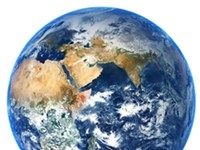Tuesday, May 19, 2015
Less water being taken from the Great Lakes
Posted By Jeremy Moule on Tue, May 19, 2015 at 2:43 PM
A US-Canada treaty that greatly restricts large-scale water withdrawals from the Great Lakes is working, says a new study prepared for the International Joint Commission. The commission is a bi-national organization that oversees water bodies shared between the United States and Canada.
The IJC is accepting comments on the study through June 30. You can comment through the commission's website.
The Great Lakes Compact took effect in 2008. The Great Lakes states and provinces agreed to ban large-scale withdrawals of water unless the water would be returned to the basin. There are limited exceptions for uses such as agriculture, public water, and power plants located within a lake's drainage basin.
In the United States, withdrawals from the Great Lakes basin peaked in 2007, then decreased approximately 4 percent each year after, the study says. Withdrawals declined by 13 percent between 2005 and 2010, it says. On a daily basis, 11,200 million gallons per day are withdrawn from the basin — most of it is returned.
Approximately 1 percent of the lakes' water is renewed each year, with the rest left over from historic glacier melt, said Ralph Pentland, a consultant and one of the report's authors, during a conference call this afternoon. (The other author is Alex Mayer, a professor of civil and environmental engineering at Michigan Technological University.)
The report makes a few recommendations to the IJC, such as improving water use data collection, getting a better understanding of how climate change will impact Great Lakes hydrology, and paying more attention to ground water withdrawals — which are not sustainable in some areas.
Otherwise, say the report's authors, the news is good.
"Progress has been steady and effective so please carry on to maintain these protections," Pentland said.
The IJC is accepting comments on the study through June 30. You can comment through the commission's website.
The Great Lakes Compact took effect in 2008. The Great Lakes states and provinces agreed to ban large-scale withdrawals of water unless the water would be returned to the basin. There are limited exceptions for uses such as agriculture, public water, and power plants located within a lake's drainage basin.
In the United States, withdrawals from the Great Lakes basin peaked in 2007, then decreased approximately 4 percent each year after, the study says. Withdrawals declined by 13 percent between 2005 and 2010, it says. On a daily basis, 11,200 million gallons per day are withdrawn from the basin — most of it is returned.
Approximately 1 percent of the lakes' water is renewed each year, with the rest left over from historic glacier melt, said Ralph Pentland, a consultant and one of the report's authors, during a conference call this afternoon. (The other author is Alex Mayer, a professor of civil and environmental engineering at Michigan Technological University.)
The report makes a few recommendations to the IJC, such as improving water use data collection, getting a better understanding of how climate change will impact Great Lakes hydrology, and paying more attention to ground water withdrawals — which are not sustainable in some areas.
Otherwise, say the report's authors, the news is good.
"Progress has been steady and effective so please carry on to maintain these protections," Pentland said.





